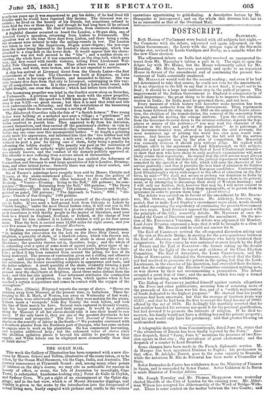POSTSCRIPT.
SATURDAY.
Both Houses of Parliament were busied with old subjects last night,— the Commons with the debate, adjourned and again adjourned, on the Indian Government ; the Lords with the antique topic of the Six-mile Bridge riot, revived by Lords Cardigan and Derby, as a suitable whet for the new Clare election.
The adjourned debate on India last night received an unexpected in- terest from Mr. Macaulay's taking a part in it. The right to open the debate lay with Mr. Hume, but the House vehemently called for Mr. Macaulay. Mr. HUME, however, persisted, and spoke to an impatient House in favour of the amendment and of continuing the present Go- vernment of India essentially unaltered. Mr. MACAULAY would vote for the second reading ; and even if he had not determined to take that course, he could not vote for the amendment. It is no objection to the bill to say that it is not final ; it ought not to be final ; it should be a large but cautious step in the path of progress. The improvement of the Indian Government in England is comparatively of small importance ; the great thing to be done is to improve the adminis- tration in India ; for India must be governed there, and not here. Every measure of which history will hereafter make mention has been taken without authority from the Home Government. Thus, reprimands from home followed the step taken in 1835 on the subject of Native educa- tion, the abolition of the transit-duties, the removal of the censorship from the press, and the making the coinage uniform. Upon the civil servants, from the Governor-General down to the revenue-collector, depends the hap- piness or misery of the natives ;—" you may read the character of the collector in the eyes and garb of the population." As to patronage, if the Governor-General were allowed to nominate the civil servants, the most monstrous age of jobbing the world has ever seen would com- mence. And because the plan proposed by the bill will fill the service with fit and superior men by the plan of competition, Mr. Macaulay was earnestly desirous it should pass without delay. Ile replied with brilliant effect to the arguments of Lord Ellenborough on this subject; and cited a host of cases—among them that of Lord Ellenborough himself— to show that men who have shone in early academic examinations will most likely retain their superiority. He argued that the civil service must always be a close service ; that the defects of the judicial department would be best remedied by the operaticn of the bill, which will raise the character of the service generally; and that it provides the best kind of admission for Natives who can compete successfully against European candidates. Controverting Lord Ellenborough's views with respect to the effect of education on the Na- tives, he said—" We shall not secure or prolong our dominion in India by attempting to exclude the Natives of that country from a share in its govern- ment, or by attempting to discourage their study of Western learning ; and I will only say further, that, however that may be, I will never consent to keep them ignorant in order to keep them manageable, or to govern them in ignorance in order to govern them long." (Loud cheers.) The debate was carried on in favour of the amendment by Mr. BLACK.. se; Mr. OTWAY, and Mr. ADDERLEY. Mr. Adderley, however, sug- gested, that to make Lord Stanley's amendment more clear, words should be added expressing the expediency of continuing the present Government for two years. Lord JOCELYN opposed the amendment, and agreed with the principle of the bill; reserving details. Mr. MANGLES at once de- fended the Court of Directors and opposed the amendment. On the mo- tion of Mr. FREDERICK Virmaits, the debate was adjourned till Monday. Lord JOHN RUSSELL expressed a hope that it will be brought to a close at that sitting. Mr. BRIGHT said he could not answer for it.
The Earl of CARDIGAN revived the oft-repeated discussion arising out of the riot at Six-mile Bridge, in moving for the correspondence between the Earl of Aberdeen and the Irish Ministers who lately tendered their resignations. In this course he was sustained at great length by the Earl of DERBY and the Earl of EGLINTON—the former raking up the details of the riot by the light of the report and evidence of the Clare Election Committee. The Earl of ABERDEEN, the Loon CHANCELLOR, and tho Duke of NEWCASTLE, defended the Government; showed that the Cabi- net had resolved to prosecute the priests in the spring, but that the Lord- Lieutenant, in the exercise of his discretion, had overruled their decision ; and that the evidence of the Election Committee contained nothing new, as was shown by their not recommending a prosecution. The debate occupied a great deal of time ; and the motion, which was only a formal pretext for speaking, was withdrawn.
The Bishop of SALISBURY justified himself against certain allegations in the Times and other publications, accusing him of retaining more of the proceeds of his see than was his due, and of a "selfish malversation of funds dedicated to the highest purposes." He showed that his yearly revenue had been uncertain, but that the average of fourteen years was 67371.; and that he had been the first to accept the fixed income of 5000i. offered by the act of 1850. Ile feelingly but manfully asserted that he bad neither hoarded his revenue nor spent it for his personal gratification, but had devoted it to promote the interests of religion. If he died to- morrow, his family would not have a shilling beyond his private property ; and his son would only have his patrimony, and that greater blessing an unblemished name.


























 Previous page
Previous page